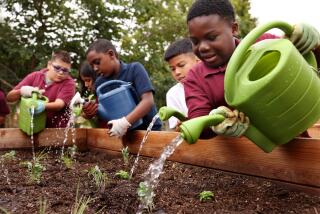Program Provides the First Lesson in Proper Behavior
The second-graders in Hadley Rickâs class at E.P. Foster Elementary School stand shoulder to shoulder, eyes fixed forward.
Gradually, bubbles begin to dance across the room, just centimeters from their faces. The glistening, soapy spheres beg to be popped, but the children allow them to float to the floor.
âLook at that self-control!â exclaims Jon Oliver, director of the Massachusetts-based Lesson One Foundation, during a recent visit to the Ventura school. âThatâs the same self-control you would use if a bully comes by, or if someone tries to give you drugs or alcohol.â
The exercise is part of Oliverâs Skills for Life program, a curriculum that aims to prevent school violence by teaching kids in kindergarten through fifth grade how to control themselves, respect others and avoid violent behavior.
Oliverâs program--what he calls âthe ABCs of lifeâ--has been used on the East Coast for nearly 30 years. Demand for it elsewhere has soared in recent years, particularly after shootings at Columbine High School in Colorado and Santana High School near San Diego put a national spotlight on campus safety.
E.P. Foster, in a Ventura neighborhood plagued for years by gangs, is the first school in California to fully implement the program, Oliver said.
âWhat a gift to give these children, with all the turmoil in their lives,â Principal Michael Babb said. âWeâre sending these kids out into the future with these skills, and theyâre going to need them.â
Skills for Life is based on a âPledge for Successâ that children and teachers recite each day. It includes promises to wait their turn to speak, to always try their best and to treat others the way they want to be treated.
Games Help Make Abstract Concepts Real
The curriculum employs often-repeated phrases such as âuse your self-control,â âtake responsibilityâ and âcelebrate diversity.â Games and simple stories help make the abstract concepts real.
In Rickâs class last week, Oliver sat at the front of the room with a cylinder filled with colorful rocks. Moving it back and forth, he asked the students to close their eyes and think about what it sounded like.
âA strong rainstorm,â said one student.
âMaking popcorn,â offered another.
âA waterfall!â piped another.
The exercise is teaching kids that different people perceive things differently, Oliver said, and that they should celebrate that diversity. It also gives them problem-solving skills, he said.
âInstead of feeling stuck, you can think of all the different answers there might be to one question,â he told them.
At E.P. Foster, Lesson One has become part of the schoolâs culture. All teachers require students to take âself-control timeâ--in which everyone sits still, breathing deeply with eyes closed for three minutes--three times a day. And the vocabulary is used constantly by teachers, administrators and students.
Officials at E.P. Foster found out about the program two years ago from a volunteer who had seen a presentation at a violence-prevention seminar.
Training and materials are funded mostly through grants obtained by the school or through the nonprofit Lesson One Foundation, Oliver said.
Since E.P. Foster started using the curriculum, officials say they have witnessed a turnaround.
Fewer students are being sent to the principalâs office for discipline. Spats on the playground are less frequent. Educators are spending less time trying to control their classes and more time teaching.
Logan Culp, who teaches fifth grade at the school, said there has been a marked improvement in his studentsâ behavior this year.
âThis is a fifth-grade class that was pretty much well-known as fourth-graders for being difficult,â Culp said. âItâs pretty amazing.â
After Oliverâs visit last week, Culpâs students talked about how the program has helped them.
âSometimes I want to give up on stuff, but it helps to know I just have to try my best,â said Kyle OâKelley, 10.
âIn fourth grade I used to call people names,â said Savannah Hottinger, 11. âI donât think Iâd like to be treated that way.â
Parents said the classroom lessons have also found their way into the home. Darcy Mendelson said that when her son, Michael, gets worked up and frustrated, she asks him to take âself-control time.â
âHeâll start the breathing, and then slowly the tears stop and he calms down. Once heâs calmed down, we can talk about why heâs upset,â she said. âItâs a miraculous thing.â
FYI
For information on the Lesson One: Skills for Life program, visit https://www.lessonone.org.
More to Read
Sign up for Essential California
The most important California stories and recommendations in your inbox every morning.
You may occasionally receive promotional content from the Los Angeles Times.










